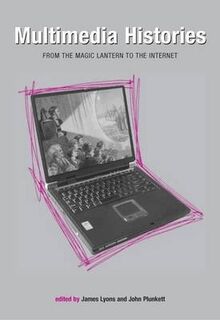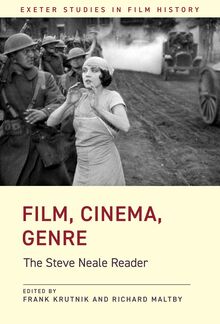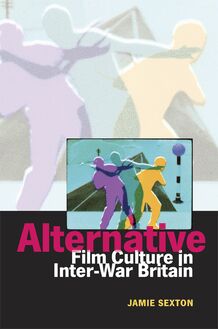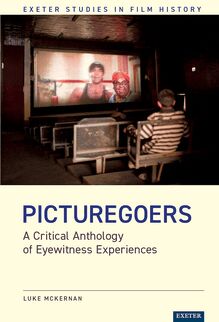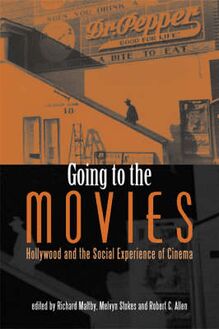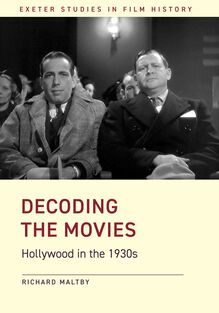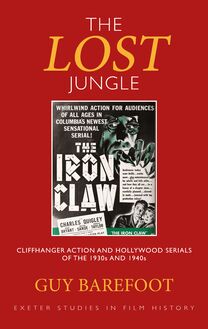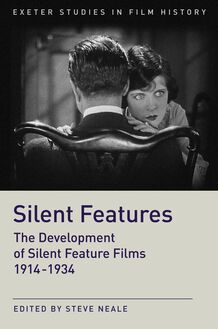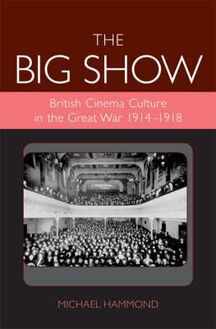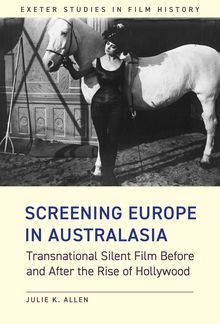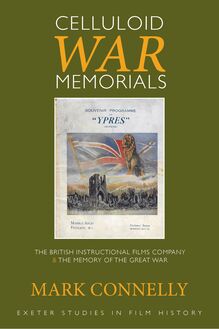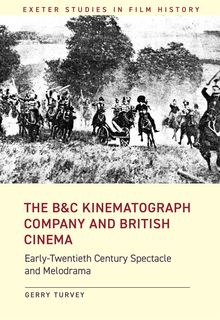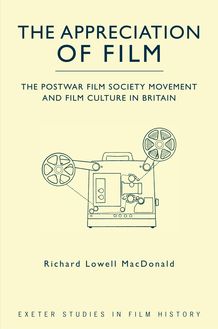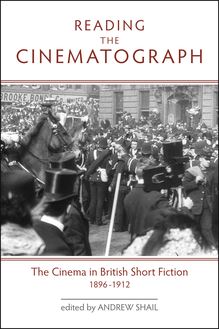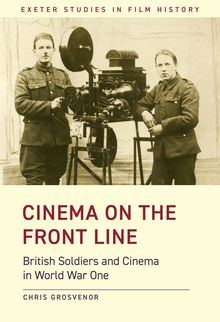-
 Univers
Univers
-
 Ebooks
Ebooks
-
 Livres audio
Livres audio
-
 Presse
Presse
-
 Podcasts
Podcasts
-
 BD
BD
-
 Documents
Documents
-
- Cours
- Révisions
- Ressources pédagogiques
- Sciences de l’éducation
- Manuels scolaires
- Langues
- Travaux de classe
- Annales de BEP
- Etudes supérieures
- Maternelle et primaire
- Fiches de lecture
- Orientation scolaire
- Méthodologie
- Corrigés de devoir
- Annales d’examens et concours
- Annales du bac
- Annales du brevet
- Rapports de stage
La lecture à portée de main
Vous pourrez modifier la taille du texte de cet ouvrage
Découvre YouScribe en t'inscrivant gratuitement
Je m'inscrisDécouvre YouScribe en t'inscrivant gratuitement
Je m'inscrisEn savoir plus
Vous pourrez modifier la taille du texte de cet ouvrage
En savoir plus

Description
This book brings together key works by pioneering film studies scholar Steve Neale. From the 1970s to the 2010s Neale’s vital and unparalleled contribution to the subject has shaped many of the critical agendas that helped to confirm film studies’ position as an innovative discipline within the humanities.
Although known primarily for his work on genre, Neale has written on a far wider range of topics. In addition to selections from the influential volumes Genre (1980) and Genre and Hollywood (2000), and articles scrutinizing individual genres – the melodrama, the war film, science fiction and film noir – this Reader provides critical examinations of cinema and technology, art cinema, gender and cinema, stereotypes and representation, cinema history, the film industry, New Hollywood, and film analysis. Many of the articles included are recommended reading for a range of university courses worldwide, making the volume useful to students at undergraduate level and above, researchers, and teachers of film studies, media studies, gender studies and cultural studies.
The collection has been selected and edited by Frank Krutnik and Richard Maltby, scholars who have worked closely with Neale and been inspired by his diverse and often provocative critical innovations. Their introduction assesses the significance of Neale’s work, and contextualizes it within the development of UK film studies.
DOI: https://doi.org/10.47788/YRCC6901
List of Illustrations
Acknowledgements
Steve Neale and Film Studies: An Introduction
Section A: Beginnings
1 The Reappearance of Movie
Review in Screen, 16.3 (1975), 112–15
2 Personal Views
Review in Screen, 17.3 (1976), 118–22
3 The Invention of Cinema
Chapter 3 of Cinema and Technology: Image, Sound, Colour (London: Macmillan, 1985)
Section B: Genre(s)
4 Genre
Chapter 3 of Genre (London: British Film Institute, 1980)
5 Questions of Genre
Screen, 31.1 (1990), 45–66
6 Genre and Hollywood
Chapter 7 of Genre and Hollywood (London: Routledge, 2000)
7 Melodrama and Tears
Screen, 27.6 (1986), 6–23
8 Aspects of Ideology and Narrative Form in the American War Film
Screen, 32.1 (1991), 33–57
Section C: Interventions and Provocations
9 Art Cinema as Institution
Screen, 22.1 (1981), 11–40
10 Masculinity as Spectacle: Reflections on Men and Mainstream Cinema
Screen, 24.6 (1983), 2–17
11 Melo Talk: On the Meaning and Use of the Term ‘Melodrama’ in the American Trade Press
The Velvet Light Trap, 32 (1993), 66–89
12 Hollywood Blockbusters: Historical Dimensions
Movie Blockbusters, ed. by Julian Stringer (London: Routledge, 2003), pp. 47–60
Section D: Film Analysis
13 Issues of Difference: Alien and Blade Runner
Fantasy and the Cinema, ed. by James Donald (London: British Film Institute, 1989), pp. 213–23
14 Narration, Point of View and Patterns in the Soundtrack of Letter from an Unknown Woman
Style and Meaning: Essays in the Detailed Analysis of Film, ed. by John Gibbs and Douglas Pye (Manchester: Manchester University Press, 2005), pp. 99–107
15 Gestures, Movements and Actions in Rio Bravo
Howard Hawks: New Perspectives, ed. by Ian Brookes (London: Palgrave/British Film Institute, 2016), pp. 110–21
16 The Art of the Palpable: Composition and Staging in the Widescreen Films of Anthony Mann
Widescreen Worldwide, ed. by John Belton, Sheldon Hall and Stephen Neale (New Barnet: John Libbey, 2010), pp. 91–106
17 ‘I Can’t Tell Anymore Whether You’re Lying’: Double Indemnity, Human Desire and the Narratology of Femmes Fatales
The Femme Fatale: Images, Histories, Contexts, ed. by Helen Hanson and Catherine O’Rawe (Basingstoke: Palgrave Macmillan, 2010), pp. 187–98
Steve Neale Bibliography
Index
Sujets
Informations
| Publié par | University of Exeter Press |
| Date de parution | 31 janvier 2021 |
| Nombre de lectures | 3 |
| EAN13 | 9781905816590 |
| Langue | English |
| Poids de l'ouvrage | 4 Mo |
Informations légales : prix de location à la page 0,6600€. Cette information est donnée uniquement à titre indicatif conformément à la législation en vigueur.
Extrait
Film, Cinema, Genre
This book brings together key works by pioneering film studies scholar Steve Neale. From the 1970s to the 2010s, Neale’s vital and unparalleled contribution to the subject has shaped many of the critical agendas that helped to confirm film studies’ position as an innovative discipline within the humanities.
Although known primarily for his work on genre, Neale has written on a far wider range of topics. In addition to selections from the influential volumes Genre (1980) and Genre and Hollywood (2000), and articles scrutinizing individual genres—the melodrama, the war film, science fiction and film noir—this Reader provides critical examinations of cinema and technology, art cinema, gender and cinema, cinema history, the film industry, New Hollywood and film analysis. Many of the articles included are recommended reading for university courses worldwide, making the volume useful to students at undergraduate level and above, as well as researchers and teachers of film studies, media studies, gender studies and cultural studies.
The collection has been selected and edited by Frank Krutnik and Richard Maltby, scholars who have worked closely with Neale and been inspired by his diverse and often provocative critical innovations. The introduction assesses the significance of Neale’s work, and contextualizes it within the development of UK film studies.
Notes on the editors
Frank Krutnik is a Reader in Film Studies at the University of Sussex. He is the author of In a Lonely Street: Film Noir, Genre, Masculinity (1991), Popular Film and Television Comedy (with Steve Neale, 1990) and Inventing Jerry Lewis (2000), and editor of Hollywood Comedians: The Film Reader (2003), Un-American Hollywood: Politics and Film in the Blacklist Era (with Steve Neale, Brian Neve, Peter Stanfield, 2003) as well as special issues of New Review of Film and Television Studies and Film Studies . Richard Maltby is the Matthew Flinders Distinguished Emeritus Professor of Screen Studies at Flinders University, Adelaide. A Fellow of the Australian Academy of the Humanities, he has published extensively on the cultural history of Hollywood and edited eight books on the history of cinema audiences, exhibition and reception, including Going to the Movies: Hollywood and the Social Experience of Cinema (UEP, 2007; coedited with Melvyn Stokes and Robert C. Allen). He is a Series Editor for Exeter Studies in Film History.
Exeter Studies in Film History
Series Editors:
Richard Maltby , Matthew Flinders Distinguished Emeritus Professor of Screen Studies, Flinders University
Helen Hanson , Associate Professor in Film History at the University of Exeter and Academic Director of the Bill Douglas Cinema Museum
Joe Kember , Professor in Film Studies at the University of Exeter
Exeter Studies in Film History is devoted to publishing the best new scholarship on the cultural, technical and aesthetic history of cinema. The aims of the series are to reconsider established orthodoxies and to revise our understanding of cinema’s past by shedding light on neglected areas in film history.
Published by University of Exeter Press in association with the Bill Douglas Centre for the History of Cinema and Popular Culture, the series includes monographs and essay collections, translations of major works written in other languages, and reprinted editions of important texts in cinema history.
Previously published titles in the series are listed at the back of this volume
First published in 2021 by University of Exeter Press Reed Hall, Streatham Drive Exeter, Devon, EX4 4QR www.exeterpress.co.uk
© Steve Neale for previously published material © 2021 Frank Krutnik and Richard Maltby for new material
The rights of Steve Neale, Frank Krutnik and Richard Maltby to be identified as authors of this work have been asserted by them in accordance with the Copyright, Designs and Patents Act 1988.
Exeter Studies in Film History
British Library Cataloguing in Publication Data
A catalogue record for this book is available from the British Library.
Hbk: 978-1-905816-58-3 ePub: 978-1-905816-59-0 PDF: 978-1-905816-60-6
Cover image: Film still from Big Parade , 1925 (Editors’ collection)
Chapter 4 : Chapter 3 of Genre (London: British Film Institute, 1980) used by permission of Bloomsbury Publishing Plc.
Chapter 11 : First published as the article ‘Melo Talk: On the Meaning and Use of the Term “Melodrama” in the American Trade Press’, by Steve Neale, in The Velvet Light Trap , 32 (1993), 66–89. © 1993 by the University of Texas Press. All rights reserved.
Chapter 13 : ‘Issues of Difference: Alien and Blade Runner ’ in Fantasy and the Cinema , ed. by James Donald (London: British Film Institute, 1989), pp. 213–23 used by permission of Bloomsbury Publishing Plc.
Chapter 15 : ‘Gestures, Movements and Actions in Rio Bravo’ in Howard Hawks: New Perspectives , ed. by Ian Brookes (London: Palgrave/British Film Institute, 2016), pp. 110–21 used by permission of Bloomsbury Publishing Plc.
Typeset in Caslon by BBR Design, Sheffield
Contents
List of Illustrations
Acknowledgements
Steve Neale and Film Studies: An Introduction
Frank Krutnik
Section A: Beginnings
1 The Reappearance of Movie
Review in Screen , 16.3 (1975), 112–15
2 Personal Views
Review in Screen , 17.3 (1976), 118–22
3 The Invention of Cinema
Chapter 3 of Cinema and Technology: Image, Sound, Colour (London: Macmillan, 1985)
Section B: Genre(s)
4 Genre
Chapter 3 of Genre (London: British Film Institute, 1980)
5 Questions of Genre
Screen , 31.1 (1990), 45–66
6 Genre and Hollywood
Chapter 7 of Genre and Hollywood (London: Routledge, 2000)
7 Melodrama and Tears
Screen , 27.6 (1986), 6–23
8 Aspects of Ideology and Narrative Form in the American War Film
Screen , 32.1 (1991), 33–57
Section C: Interventions and Provocations
9 Art Cinema as Institution
Screen , 22.1 (1981), 11–40
10 Masculinity as Spectacle: Reflections on Men and Mainstream Cinema
Screen , 24.6 (1983), 2–17
11 Melo Talk: On the Meaning and Use of the Term ‘Melodrama’ in the American Trade Press
The Velvet Light Trap , 32 (1993), 66–89
12 Hollywood Blockbusters: Historical Dimensions
Movie Blockbusters , ed. by Julian Stringer (London: Routledge, 2003), pp. 47–60
Section D: Film Analysis
13 Issues of Difference: Alien and Blade Runner
Fantasy and the Cinema , ed. by James Donald (London: British Film Institute, 1989), pp. 213–23
14 Narration, Point of View and Patterns in the Soundtrack of Letter from an Unknown Woman
Style and Meaning: Essays in the Detailed Analysis of Film , ed. by John Gibbs and Douglas Pye (Manchester: Manchester University Press, 2005), pp. 99–107
15 Gestures, Movements and Actions in Rio Bravo
Howard Hawks: New Perspectives , ed. by Ian Brookes (London: Palgrave/British Film Institute, 2016), pp. 110–21
16 The Art of the Palpable: Composition and Staging in the Widescreen Films of Anthony Mann
Widescreen Worldwide , ed. by John Belton, Sheldon Hall and Stephen Neale (New Barnet: John Libbey, 2010), pp. 91–106
17 ‘I Can’t Tell Anymore Whether You’re Lying’: Double Indemnity , Human Desire and the Narratology of Femmes Fatales
The Femme Fatale: Images, Histories, Contexts , ed. by Helen Hanson and Catherine O’Rawe (Basingstoke: Palgrave Macmillan, 2010), pp. 187–98
Steve Neale Bibliography
Index
Illustrations
Picture sourced from the editors’ collection except where otherwise indicated
3. ‘The Invention of Cinema’
3.1 Edison Kinetoscope
3.2 Edison Kinetoscope (interior)
3.3 Lumière Cinématographe, courtesy of the Bill Douglas Cinema Museum, University of Exeter
3.4 Everyday spectacle: Le repas de bébé (Lumière, 1895)
3.5 Staged spectacle: The Barbershop (Edison, 1894)
5. ‘Questions of Genre’
5.1 Advertisement for The Fight at the Mill (1912) and two other Western ‘Americans’, Moving Picture World (27 July 1912)
5.2 Advertisement for The Last Stand of the Dalton Boys (1912), Moving Picture World (20 July 1912)
5.3 Advertisement for the re-release of Boots and Saddles (1937), Film Daily (19 May 1943)
7. ‘Melodrama and Tears’
7.1 The Big Parade (1925)
7.2 Yanks (1979)
7.3 Broken Blossoms (1919)
7.4 Broken Blossoms
7.5 Broken Blossoms
7.6 City Lights (1931)
7.7 Imitation of Life (1958)
10. ‘Masculinity as Spectacle’
10.1 El Cid (1961)
10.2 Le Samouraï (1971)
10.3 The Man Who Shot Liberty Valance (1962)
10.4 Saturday Night Fever (1978)
11. ‘Melo Talk: On the Meaning and Use of the Term “Melodrama” in the American Trade Press’
11.1 Lobby card for The Big House (1930)
11.2 Poster for The Big Heat (1953)
11.3 Poster for Rebel without a Cause (1956)
11.4 Poster for Written on the Wind (1956)
11.5 Newspaper advertisement for Home from the Hill (1960)
11.6 Advertisement for Dark Victory (1939)
14. ‘Narration, Point of View and Patterns in the Soundtrack of Letter from an Unknown Woman ’
14.1 Letter From an Unknown Woman (1948)
14.2 Letter From an Unknown Woman
14.3 Letter From an Unknown Woman
14.4 Letter From an Unknown Woman
15. ‘Gestures, Movements and Actions in Rio Bravo ’
15.1 Rio Bravo (1959)
15.2 Rio Bravo
15.3 Rio Bravo
15.4 Rio Bravo
16. ‘The Art of the Palpable’
16.1 Spartacus (1960)
16.2 Spartacus
16.3 Spartacus
16.4 Spartacus
16.5 Spartacus
16.6 Spartacus
16.7 Spartacus
16.8 Spartacus
16.9 El Cid (1961)
16.10 El Cid
16.11 The Man from Laramie (1955)
16.12 The Last Frontier (1955)
Acknowledgements
The editors would like to thank the following for their invaluable help in making this Reader possible: Karen Edwards, for her unflagging support for this project; Anna Henderson, Nigel Massen and David Hawkins at University of Exeter Press, as well as Simon Baker for initially commissioning the book; Helen Hanson and Joe Kember, the co-editors of Exeter Studies in Film History; Will Straw for his conscientious ap
-
 Univers
Univers
-
 Ebooks
Ebooks
-
 Livres audio
Livres audio
-
 Presse
Presse
-
 Podcasts
Podcasts
-
 BD
BD
-
 Documents
Documents
-
Jeunesse
-
Littérature
-
Ressources professionnelles
-
Santé et bien-être
-
Savoirs
-
Education
-
Loisirs et hobbies
-
Art, musique et cinéma
-
Actualité et débat de société
-
Jeunesse
-
Littérature
-
Ressources professionnelles
-
Santé et bien-être
-
Savoirs
-
Education
-
Loisirs et hobbies
-
Art, musique et cinéma
-
Actualité et débat de société
-
Actualités
-
Lifestyle
-
Presse jeunesse
-
Presse professionnelle
-
Pratique
-
Presse sportive
-
Presse internationale
-
Culture & Médias
-
Action et Aventures
-
Science-fiction et Fantasy
-
Société
-
Jeunesse
-
Littérature
-
Ressources professionnelles
-
Santé et bien-être
-
Savoirs
-
Education
-
Loisirs et hobbies
-
Art, musique et cinéma
-
Actualité et débat de société
- Cours
- Révisions
- Ressources pédagogiques
- Sciences de l’éducation
- Manuels scolaires
- Langues
- Travaux de classe
- Annales de BEP
- Etudes supérieures
- Maternelle et primaire
- Fiches de lecture
- Orientation scolaire
- Méthodologie
- Corrigés de devoir
- Annales d’examens et concours
- Annales du bac
- Annales du brevet
- Rapports de stage
